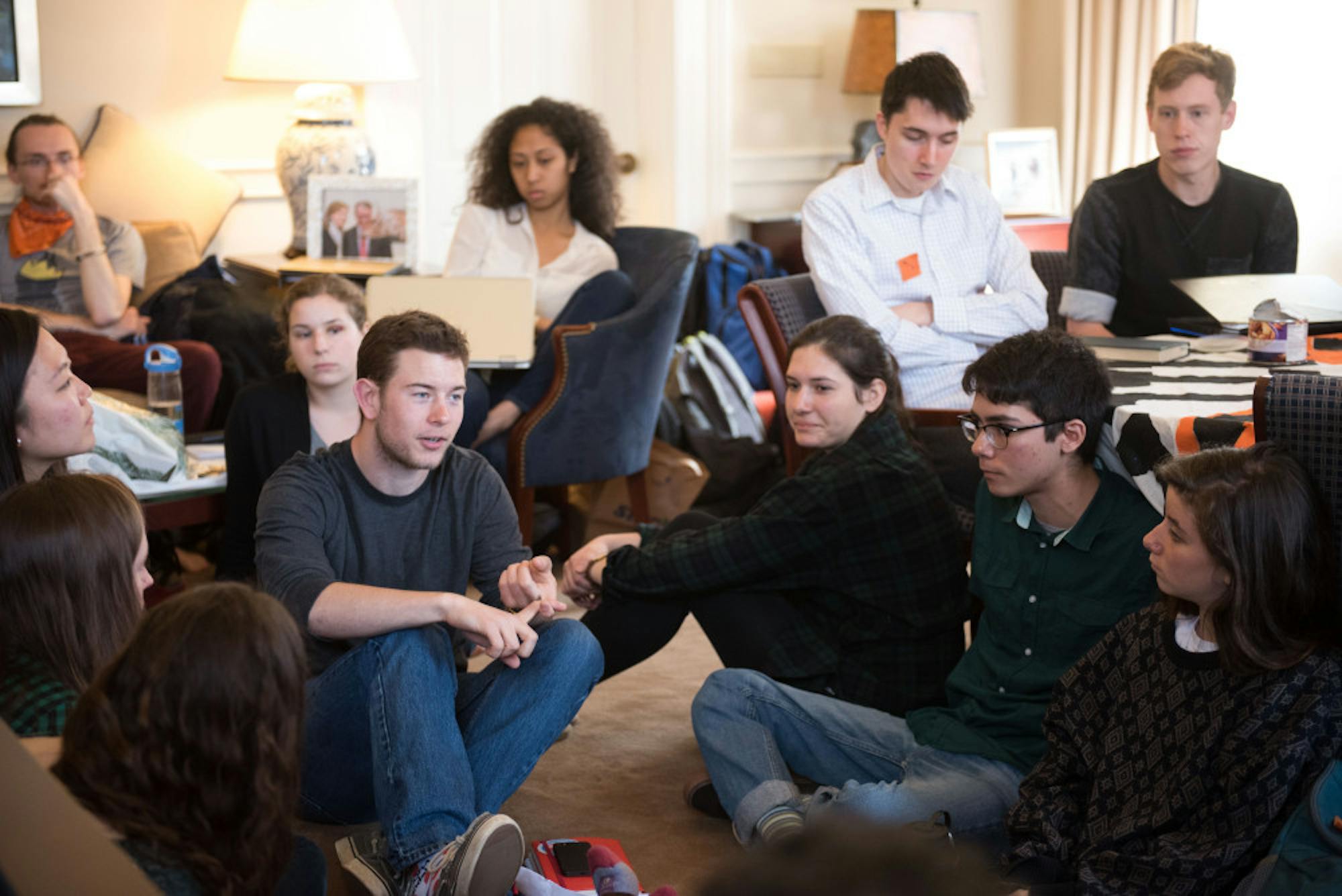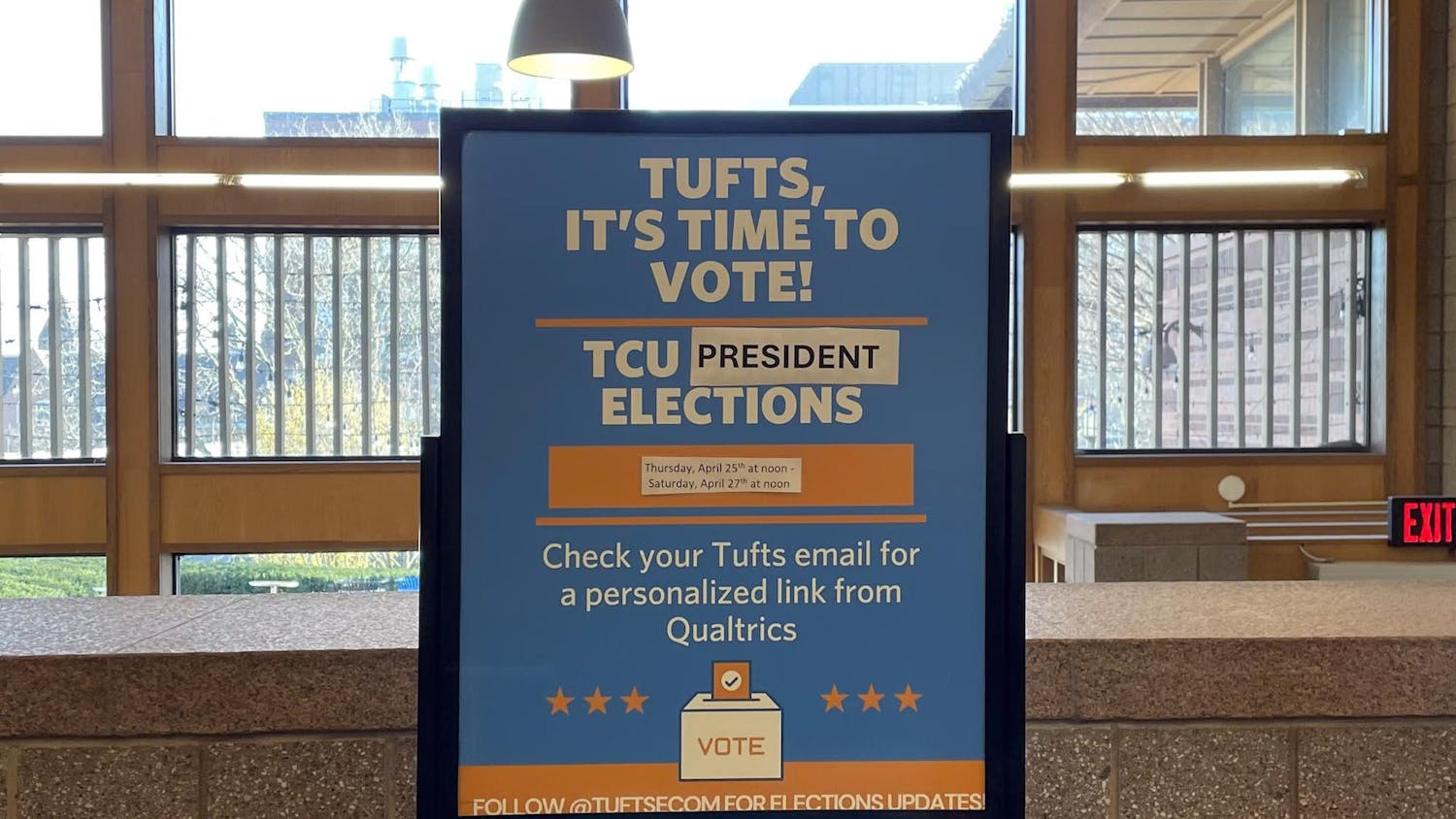Disciplinary action against two Tufts Climate Action (TCA) members for their involvement in the sit-in protest in University President Anthony Monaco’s office last April was reduced following an appeal hearing last Friday.
The hearing was an appeal against the Disciplinary Probation Level II punishment that TCA members Shana Gallagher, a junior, and Dylan Carlson, a sophomore, had received for the Ballou Hall sit-in, resulting in a reduced punishment of Probation I, Gallagher said.
According to Gallagher and Carlson, the TCA members who participated in the sit-in were responding to Monaco’s May 2014 baccalaureate speech to the Class of 2014, in which he said that his door is open "to march into Ballou Hall and demand attention."
Although the 33 members of TCA who participated in the sit-in received either Disciplinary Probation Level I or II, only Gallagher and Carlson chose to appeal the decision, Gallagher said.
“I understand why the other students chose to accept the...decision, but I definitely didn’t want to do that,” she said. “I am appealing with [Carlson] because I think this is a really important opportunity to educate the Tufts community about the role of activism on our campus and especially as it pertains to the climate crisis.”
Over 40 faculty, staff and students attended the Oct. 23. hearing in the Mayer Campus Center. The hearing lasted five hours, and the panel released its decision via email after deliberating for over an hour, Carlson said.
The panel consisted of two student members from the Tufts Community Union (TCU) Judiciary, one faculty member and two staff volunteers, according to Judicial Affairs Officer Mickey Toogood. All panelists are trained at the beginning of the year in the Student Judicial Process, he said.
According to Gallagher, the official charges against her and Carlson included a lack of cooperation with university officials and violations of the university’s official protest policy, specifically failure to identify oneself, unauthorized entry into a private office, failure to disperse and interference with scheduled duties.
Gallagher and Carlson each got five minutes at the hearing for an opening statement. These were followed by questions from the panel and opportunities for Gallagher and Carlson to bring witnesses for statements and questioning.
Students stood along the walls to watch the hearing, which is unusual for Student Judicial Process hearings, according to Toogood.
"Open hearings are very rare," Toogood told the Daily in an email. "I have been working in the Dean of Student Affairs Office for four years, and this is the first time that all of the involved parties agreed to have an open hearing. Usually at least one of the parties would like a closed hearing for privacy reasons."
Gallagher said that Toogood convened the hearing and was also a plaintiff and a witness for the case.
“It seems like a conflict of interest,” she said. “Especially since two of the supposedly impartial judges on the panel [were] two administrators who report to Dean [of Student Affairs Mary Pat] McMahon, who also is one of the plaintiffs and one of the witnesses.”
According to Toogood, the hearing had no formal complaining party. Instead, the Student Affairs Office received information about an incident with violations of university policy.
"Since there is no complaining party, the parts of the hearing procedure that involve a complaining party are simply omitted," he said. "But the general order of events is exactly the same: opening statements, questions by the panel, witnesses, closing statements, etc."
The hearing had 11 witnesses, Toogood said. Witnesses are primarily called to provide fact-based testimony or speak on the involved party's character, he added.
In addition to testimony from student, faculty and staff witnesses, Gallagher and Carlson played a video from Bill McKibben, co-founder of international environmental organization 350.org, who defended their argument.
“I think this hearing...is of critical importance, just like this divestment campaign,” McKibben said in the video. “The work that Shana [Gallagher]and colleagues have done to pressure Tufts is of a piece with the work going on at thousands of institutions around the world.”
While Disciplinary Probation Level I and II have been discontinued as sanctions as of July 2015, the conduct appealed in this hearing occurred in the previous academic year and is subject to the guidelines outlined in the 2014-2015 Student Judicial Process, Toogood said.
"The main difference between Disciplinary Probation Level I and Level II is that the former leaves a student in good standing, while the latter takes a student out of good standing at the university," he told the Daily in an email. "Being out of good standing can affect a student's ability to participate in certain kinds of programs, including studying abroad and varsity sports. Disciplinary Probation Level II also results in a transcript notation for the duration of the probationary period, while Disciplinary Probation Level I does not."
Gallagher said that despite the disciplinary charges, the sit-in was productive for TCA. It resulted in an agreement with Executive Vice President Patricia Campbell as well as a meeting with Peter Dolan, chairman of the Office of Trustees in which TCA members and Dolan agreed to plan a climate justice symposium in the spring.
“I am happy to do anything that makes more people think about this and realize that it's real, [that] it's already happening and [that] it's affecting people and the one planet we have,” she said.
The administration is not allowed to comment on the hearing as part of ongoing disciplinary action, according to McMahon.






